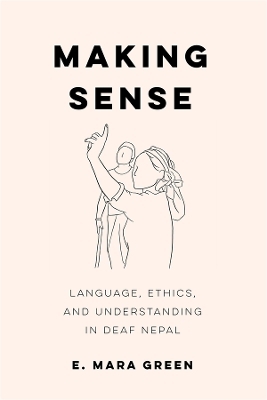
Making Sense
Language, Ethics, and Understanding in Deaf Nepal
Seiten
2024
University of California Press (Verlag)
978-0-520-39923-5 (ISBN)
University of California Press (Verlag)
978-0-520-39923-5 (ISBN)
A free ebook version of this title is available through Luminos, University of California Press's Open Access publishing program. Visit www.luminosoa.org to learn more.
Making Sense explores the experiential, ethical, and intellectual stakes of living in, and thinking with, worlds wherein language cannot be taken for granted. In Nepal, many deaf signers use Nepali Sign Language (NSL), a young, conventional signed language. The majority of deaf Nepalis, however, use what NSL signers call natural sign. Natural sign involves conventional and improvisatory signs, many of which recruit semiotic relations immanent in the social and material world. These features make conversation in natural sign both possible and precarious. Sense-making in natural sign depends on signers' skillful use of resources and on addressees' willingness to engage. Natural sign reveals the labor of sense-making that in more conventional language is carried by shared grammar. Ultimately, this highly original book shows that emergent language is an ethical endeavor, challenging readers to consider what it means, and what it takes, to understand and to be understood.
Making Sense explores the experiential, ethical, and intellectual stakes of living in, and thinking with, worlds wherein language cannot be taken for granted. In Nepal, many deaf signers use Nepali Sign Language (NSL), a young, conventional signed language. The majority of deaf Nepalis, however, use what NSL signers call natural sign. Natural sign involves conventional and improvisatory signs, many of which recruit semiotic relations immanent in the social and material world. These features make conversation in natural sign both possible and precarious. Sense-making in natural sign depends on signers' skillful use of resources and on addressees' willingness to engage. Natural sign reveals the labor of sense-making that in more conventional language is carried by shared grammar. Ultimately, this highly original book shows that emergent language is an ethical endeavor, challenging readers to consider what it means, and what it takes, to understand and to be understood.
E. Mara Green is Assistant Professor of Anthropology at Barnard College, Columbia University.
| Erscheinungsdatum | 05.07.2024 |
|---|---|
| Zusatzinfo | 3 color illustrations, 4 b-w illustrations, 27 line art, 6 tables |
| Verlagsort | Berkerley |
| Sprache | englisch |
| Maße | 152 x 229 mm |
| Gewicht | 363 g |
| Themenwelt | Geisteswissenschaften ► Archäologie |
| Sozialwissenschaften ► Ethnologie | |
| Sozialwissenschaften ► Kommunikation / Medien ► Kommunikationswissenschaft | |
| Sozialwissenschaften ► Soziologie | |
| ISBN-10 | 0-520-39923-4 / 0520399234 |
| ISBN-13 | 978-0-520-39923-5 / 9780520399235 |
| Zustand | Neuware |
| Informationen gemäß Produktsicherheitsverordnung (GPSR) | |
| Haben Sie eine Frage zum Produkt? |
Mehr entdecken
aus dem Bereich
aus dem Bereich
Eine Einführung
Buch | Softcover (2022)
Springer VS (Verlag)
27,99 €
Strategie und Methodik für Designprozesse
Buch | Hardcover (2023)
Birkhäuser (Verlag)
48,00 €


